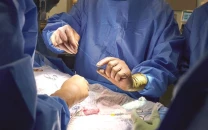Two suspected Congo virus patients die in Rahim Yar Khan
Both patients passed away before being treated

PHOTO: FILE
At least two suspected Congo virus patients passed away during the past 48 hours in Rahim Yar Khan.
Doctors at Sheikh Zayed Hospital told Express News that Humaira, 20, a resident of Chak No 98-NP, and 40-year-old Hameedan Bibi, were brought to the health facility in critical condition. They added that the symptoms of both women suggested that they had been infected by the Congo virus.
Both patients were admitted while their blood was drawn. However, both women died before being treated. The bodies of the victims were handed over to their family after completing legal formalities.
Health experts have warned that prevention is the best way since there is no vaccine currently available for the disease and the only way to reduce infections is by raising awareness. They said that areas where there is a large population of domesticated animals can be affected by this disease.
Last year, Pakistan saw as many as 51 cases of Congo fever. Since the beginning of this year, a total of 59 suspected cases have been submitted to the National Institute of Health. Out of these, eight were found to be positive for Crimean-Congo Hemorrhagic Fever (CCHF).
They maintained that healthcare workers along with animal herders, veterinarians, para-veterinary staff, livestock workers, animal merchants, butchers and slaughterhouse workers are the most vulnerable to the disease.
Apart from them, those involved in burial practices are also at risk of being infected.
Experts explained that CCHF is a tick-borne virus (Nairovirus) of the Bunyaviridae family with a fatality rate of 10% to 40%. Ticks are a reservoir and a vector for CCHF. Numerous wild and domestic animals, such as cattle, buffaloes, goats and sheep, are silent carriers of this virus.
They maintained that those handling animals should wear gloves and other protective clothing while slaughtering, butchering and culling.
Health officials also urged the public to avoid close physical contact with those infected with CCHF, to wear gloves and protective equipment when taking care of patients and to wash their hands thoroughly after caring for or visiting the sick.
They also advised people to adopt safety measures when somebody infected with the virus passes away.



















COMMENTS
Comments are moderated and generally will be posted if they are on-topic and not abusive.
For more information, please see our Comments FAQ